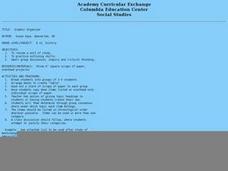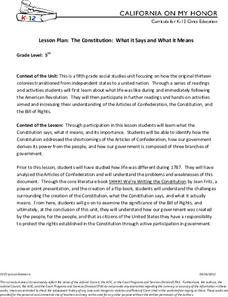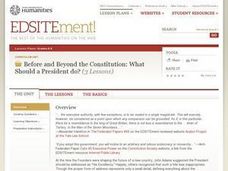Curated OER
What's My Line: Federalists and Anti-Federalists
Fifth graders work in groups to research the historical context and significance of the Federalist and Anti-Federalist movements of the eighteenth century. They create data collection spreadsheets, write persuasive papers, design a...
What So Proudly We Hail
The Meaning of America: Enterprise and Commerce
Using Mark Twain's The Man That Corrupted Hadleyburg, invite your learners to consider the concept of virtue in a democratic society devoted to gain and self-interest. This stellar resource guides your class members through a close...
Curated OER
We the People Lesson 2
Students compare the Federalists and Anti-Federalists visions for the U.S. government. In this government lesson, students conduct research on Federalists and Anti-Federalists figures. Students use their findings to help them write...
Curated OER
Why a Bill of Rights? What Impact Does it Have?
Students explore the Bill of Rights. In this Bill of Rights lesson, students compare the Federalist view of government to the Anti-Federalist view of government. Students consider the impact of the bill of rights as they take notes on...
Curated OER
Explore the Constitution
Students examine the U.S. Constitution. In this American history instructional activity, students explore the founders' vision of U.S. government as they participate in readers' theatre, role-playing scenarios, and constitutional...
Annenberg Foundation
The New Nation
The conclusion of the American Revolution brought about a new conflict—choosing the stye of government for the newly formed United States. Using the views of both Federalists and Anti-Federalists, learners work in pairs and groups to...
Curated OER
Graphic Organizing: Early American History
In collaborative groups, young US historians sort cards (each labeled with a single early American event or issue) according to which of the first four presidents was leading the country at the time. Learners copy the events onto a...
Curated OER
Congress and the Creation of the Bill of Rights
Students participate in inquiry activities to explore powers outlined in the Bill of Rights. In this Bill of Rights lesson plan, students creation of a class Bill of Rights, evaluate and propose amendments, and analyze primary source...
Curated OER
Federalism
Students become familiar with the Federalist papers and the work of the federal government. In this federalism lesson plan, students find similarities and differences between state and federal government.
Curated OER
Roles of Individuals and Groups in Politics
Pupils review the Federalist Paper by James Madison. They discuss the influence of interest groups in contemporary politics.
National Endowment for the Humanities
Background on the Patriot Attitude toward the Monarch
Learners explain the Patriot attitude toward the British monarchy, which helps them embrace the Founders' reluctance to have a strong executive under the Articles of Confederation as well as their desire to build in checks of executive...
Curated OER
Federalist and Antifederalist Papers
Students debate the Federalist and Anti-federal Papers after using the Internet as a research tool.
Judicial Branch of California
The Constitution: What It Says and What It Means
Learners get the chance to act as representatives to the Constitution Convention, and must decide whether or not to recommend your state ratify the new framework. After examining the Constitution line-by-line, they consider their...
Curated OER
Government: The Power of Persuasion
Students are able to define and identify a type of interest group. They are able to describe some strategies used by interest group. Students are able to identify the postive and negative aspects of interest groups.
Curated OER
Arguments Against Ratifying the Constitution
Young scholars define federalism, Federalist, and Anti-Federalist, debate issue of ratification in classroom convention, and take vote on whether to add bill of rights. Three lessons on one page.
Curated OER
The Philadelphia Convention/Constitutional Convention
Eleventh graders explore the major points covered during the Philadelphia Convention/Constitutional Convention. They discuss the Federalists and the Anti federalists. They discuss the Bill of Rights and the drafting of the Constitution....
Curated OER
George Washington: The Precedent President
Students investigate precedents set during George Washington's term in office. They conduct Internet research, develop a list of the responsibilities of the President, match Washington's accomplishments with the list, and play a game.
Curated OER
Before and Beyond the Constitution: What Should a President Do?
Students discuss the powers and responsibilities of the President, list some precedents established during Washington's presidency, and match presidential actions with the type of Executive power it is.
National Endowment for the Humanities
George Washington: The Precedent President
Everyone knows that George Washington was the first president, but do your scholars know why that was so important? The lesson plan, the third in a sequence of three, allows learners to understand how George Washington set a precedent...
National Endowment for the Humanities
Lesson 4 James Madison: Internal Improvements Balancing Act—Federal/State and Executive/Legislative
Who has the power? The founding fathers asked the same question when the United States was formed. Learners explore issues that arose during Madison’s presidency that raised constitutional questions. Through discovery, discussion, and...
National Endowment for the Humanities
James Madison: Raising an Army—Balancing the States and the Federal Government
To war! To war! Every nation in the history of the world has had to deal with warfare on some level. Scholars go through a series of activities and discussions surrounding the development of the Constitution to help them better...
National Endowment for the Humanities
Lesson 2 James Madison: The Second National Bank—Powers Not Specified in the Constitution
How much power is too much power for the federal government? Scholars use primary documents and constitutional research in groups to analyze the creation of the Second National Bank under James Madison. This is the second lesson plan of...
Curated OER
James Madison: From Father of the Constitution to President
Students investigate reasons why James Madison is called the "Father of the Constitution." They discuss three events during his presidency that raised constitutional questions and look at Madison's opinions of those questions. They...
Music Publishers Association of the United States
I Made It. I Own It. Please Don't Steal It.
Explore the world of copyright law with a variety of activities to instill the importance of respecting creative property. Scholars watch an animated tale then take part in a grand conversation detailing the video's main idea, details,...
Other popular searches
- The Federalist Papers
- Federalist Papers 10
- Anti Federalist Papers
- Federalist Papers 6 8
- Federalist Papers Essay
- Federalist Papers 70
- Federalist Papers and Texas
- Federalist Papers #10

























